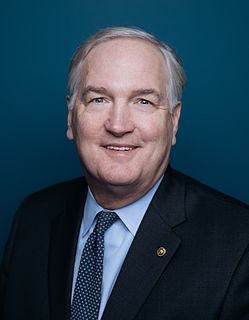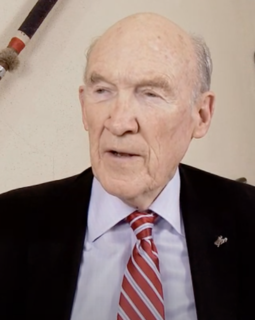A Quote by Murray Rothbard
Leading the boom of 1838 were state governments, who, finding themselves with the unexpected windfall of a distributed surplus from the federal government, proceeded to spend the money wildly and borrow even more extravagantly on public works and other uneconomic forms of 'investment.'
Related Quotes
Let us never forget this fundamental truth: the State has no source of money other than money which people earn themselves. If the State wishes to spend more it can do so only by borrowing your savings or by taxing you more. It is no good thinking that someone else will pay - that 'someone else' is you. There is no such thing as public money; there is only taxpayers' money.
Today government touches everything in America and harms almost everything it touches. Federal, state, and local governments together spend 42 out of every 100 dollars we earn. Those who do the taxing and spending have long since ceased to work for the people as a whole. Rather, they work for themselves and for their clients-the education industry, the welfare culture, public-employee unions, etc.
But ambitious encroachments of the federal government, on the authority of the State governments, would not excite the opposition of a single State, or of a few States only. They would be signals of general alarm . . . But what degree of madness could ever drive the federal government to such an extremity.
It is a travesty, in my mind, for the state and local governments on the one hand to expect the Federal government to reimburse them for costs attributable to illegal immigrants, when on the other hand the State and local governments prohibit their own law enforcement and other officials from cooperating with the Immigration and Naturalization Service to locate or apprehend or expel illegal aliens.
The simple index fund solution has been adopted as a cornerstone of investment strategy for many of the nation's pension plans operated by our giant corporations and state and local governments. Indexing is also the predominant strategy for the largest of them all, the retirement plan for federal government employees, the Federal Thrift Savings Plan (TSP). The plan has been a remarkable success, and now holds some $173 billion of assets for the benefit of our public servants and members of armed services.
The Constitution does not protect the sovereignty of States for the benefit of the States or state governments as abstract political entities, or even for the benefit of the public officials governing the States. To the contrary, the Constitution divides authority between federal and state governments for the protection of individuals.
Until the 1930s, the Constitution served as a major constraint on federal economic interventionism. The government's powers were understood to be just as the framers intended: few and explicitly enumerated in our founding document and its amendments. Search the Constitution as long as you like, and you will find no specific authority conveyed for the government to spend money on global-warming research, urban mass transit, food stamps, unemployment insurance, Medicaid, or countless other items in the stimulus package and, even without it, in the regular federal budget.
There isn't a single government agency that can't function. There's more money in this federal government, there's more money allocated than these people can possibly spend. They have to concoct asinine ways to spend it, like advertising for new food stamp users. I've gotten to the point, I'm just so righteously indignant and offended at the very idea that our government could ever run out of money when we've got a printing press, for crying out loud. Printed three and a half trillion dollars over seven years and flooded Wall Street with it.
It is important to strengthen the State governments; and as this cannot be done by any change in the Federal Constitution (for the preservation of that is all we need contend for), it must be done by the States themselves, erecting such barriers at the constitutional line as cannot be surmounted either by themselves or by the General Government. The only barrier in their power is a wise government. A weak one will lose ground in every contest.





































